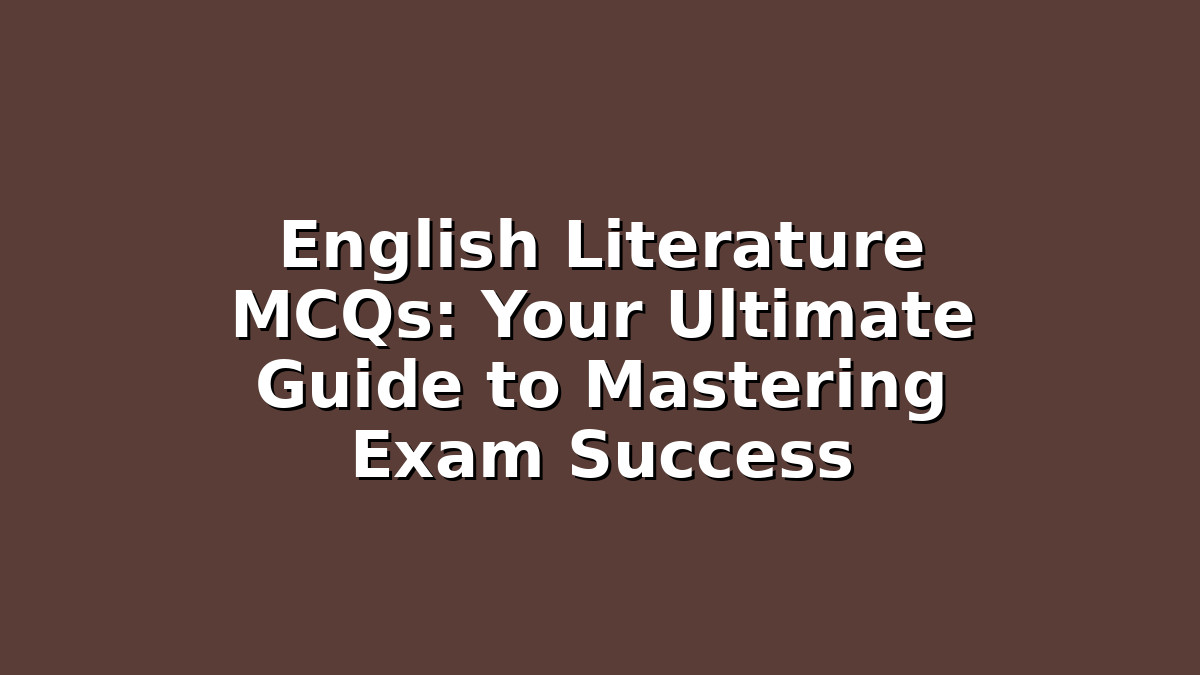Preparing for English Literature exams can be both exciting and challenging. Whether you’re revising for school tests, college entrance exams, or competitive assessments, one of the most effective ways to strengthen your knowledge and boost your confidence is by practicing Multiple Choice Questions (MCQs). English Literature MCQs help you review key concepts, test your understanding of literary works, and develop quick-thinking skills that are essential for exam success.
In this comprehensive guide, we’ll explore how you can approach English Literature MCQs strategically, share study tips that enhance retention, and recommend resources to help you excel. Let’s dive in!
Why English Literature MCQs Are Important for Students
English Literature is a vast subject, encompassing poetry, drama, prose, and literary theory from various time periods and cultures. MCQs help distill this wealth of information into manageable bites that can be quickly tested and reviewed. They are commonly used in exams because:
– They test a wide range of knowledge: From author backgrounds and literary devices to plot details and thematic analysis.
– They improve time management: Practicing MCQs trains you to answer quickly and accurately under exam conditions.
– They identify weak areas: By reviewing the questions you get wrong, you pinpoint topics needing more study.
– They build confidence: Consistent practice reduces exam anxiety and boosts your confidence.
Now that you understand their value, let’s explore how you can make the most of English Literature MCQs.
—
Section 1: How to Approach English Literature MCQs Effectively
Effectively tackling MCQs requires more than just guessing answers. Here are some steps to maximize your performance:
#### Read Questions Carefully
Many students lose marks by rushing through questions. Always read each MCQ and all answer options carefully before choosing. Look for keywords that indicate time frames, characters, or specific literary devices.
#### Use Process of Elimination
If you’re unsure about an answer, start by eliminating obviously incorrect options. Narrowing choices increases your chances of selecting the right answer and reduces guesswork.
#### Understand Question Types
English Literature MCQs may focus on:
– Recall: Facts about authors, publication dates, or plot points.
– Comprehension: Understanding of themes, motifs, or character motivations.
– Analysis: Interpretation of literary devices, symbolism, or style.
Knowing what type of question you’re answering helps you focus your thinking accordingly.
#### Manage Your Time
Practice pacing yourself so that you can answer all MCQs within the allotted time. Don’t spend too long on a single question; mark it and move on if needed, then return later.
—
Section 2: Study Tips to Improve Your English Literature MCQ Performance
You can boost your MCQ scores by incorporating these study strategies into your routine:
#### 1. Create Summary Notes and Flashcards
Condense your study material into brief notes highlighting key points about:
– Major authors and their works
– Historical contexts and literary movements
– Important themes and literary terms
Flashcards are excellent tools for quick revision of facts and definitions. Apps like Anki or Quizlet can help you create digital flashcards that you can review anytime.
#### 2. Practice Regularly with Past Papers and Online Quizzes
Consistent practice is essential. Find past exam papers or online MCQ quizzes focused on English Literature topics. This practice helps familiarize you with common question formats and recurring themes.
Try to simulate exam conditions by timing yourself and avoiding distractions. Review explanations for any questions you get wrong to deepen your understanding.
#### 3. Discuss and Teach Others
Study groups or discussion forums allow you to talk through challenging topics. Explaining literary concepts to peers reinforces your knowledge and reveals insights you might have missed.
If you don’t have a study group, try teaching the material to a friend or even aloud to yourself. This active engagement enhances memory retention.
—
Section 3: Leveraging Technology and Resources for English Literature MCQs
In the digital age, numerous resources can supplement your study:
#### Online MCQ Platforms
Websites like ProProfs, Study.com, and Khan Academy offer English Literature MCQs on a variety of topics. These platforms often provide instant feedback and detailed explanations, helping you learn from mistakes.
#### Mobile Apps
Apps tailored for literature revision can be very convenient. Look for apps that cover literary terms, author biographies, and key texts with multiple-choice quizzes. This way, you can turn idle moments into productive study sessions.
#### YouTube Channels and Podcasts
Educational YouTube channels and podcasts focused on English Literature can help clarify difficult concepts and provide context that enriches your understanding. Use these in conjunction with MCQ practice to build a well-rounded grasp of the subject.
—
Conclusion: Your Path to Mastering English Literature MCQs
English Literature MCQs are a valuable tool in your exam preparation arsenal. By approaching questions strategically, employing effective study techniques, and leveraging technology and resources, you can unlock your full potential and perform confidently on exam day.
Remember, improvement takes time and consistent effort. Celebrate small victories along the way and stay motivated by reminding yourself of your goals. With the right mindset and preparation, mastering English Literature MCQs is within your reach. Keep practicing, keep learning, and success will follow!
Best of luck with your studies!

Responses